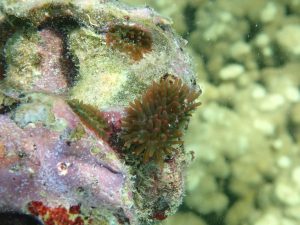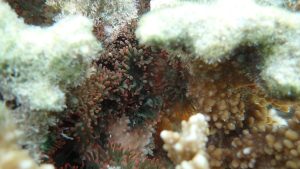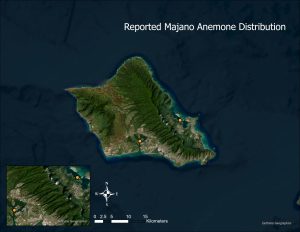Majano Anemone
MAJANO ANEMONE (ANEMONIA MANJANO)
Description:
- Small brown to tan anemone with green tentacles
- Rounded tips with light, sometimes pink coloration (DAR field observation)
Habitat:
- Native to the Indian Ocean. Records indicate spread into the Philippines and Western Pacific (Vallejo et al. 2019)
- Ability to colonize multiple substrates, including rock, rubble, and sand, as well as both live and dead coral (Tkachenko & Britayev, 2016)
Impacts & Concern:
- Rapid growth paired with few known predators leads to unchecked spread
- Can detach from the substrate and relocate while leaving behind tissue to grow into a new anemone
- Easily fragments when disturbed; each fragment can grow into a viable adult
- Can colonize a variety of coral forms, including branching, encrusting, and mounding (Tkachenko & Britayev, 2016)
- Small size and cryptic nature can lead to difficulty with monitoring and removal efforts
Introduction:
- Likely introduced from aquarium releases
Distribution in Hawaiʻi:
- Kauai: Not documented
- Oʻahu: Pearl Harbor & Kāne‘ohe Bay
- Molokai: Not documented
- Lanai: Not documented
- Maui: Not documented
- Big Island: Not documented
Related AIS Team Management Projects:
- AIS is collaborating with NERR, HIMB, DoD, TNC, NOAA, and colleagues from DAR on monitoring and eradication efforts
News:
Regulations:
- Restricted for private and commercial use including for research by universities or government agencies, exhibition in municipal zoos or government-affiliated aquariums, for other institutions for medical or scientific purposes (§4-71-6.5)
- Does not include individual possession of an animal as a pet
References:
- Vallejo, B. M., Aloy, A. B., Ocampo, M., Conejar-Espedido, J., & Manubag, L. M. (2019). Manila bay ecology and associated invasive species. Impacts of Invasive Species on Coastal Environments: Coasts in Crisis, 145-169.
- Tkachenko, K. S., & Britayev, T. A. (2016). Unusually high abundance of the actiniarian Anemonia manjano Carlgren, 1900 outcompeting scleractinians in central Vietnam. Marine Biodiversity, 46(3), 545-546.



